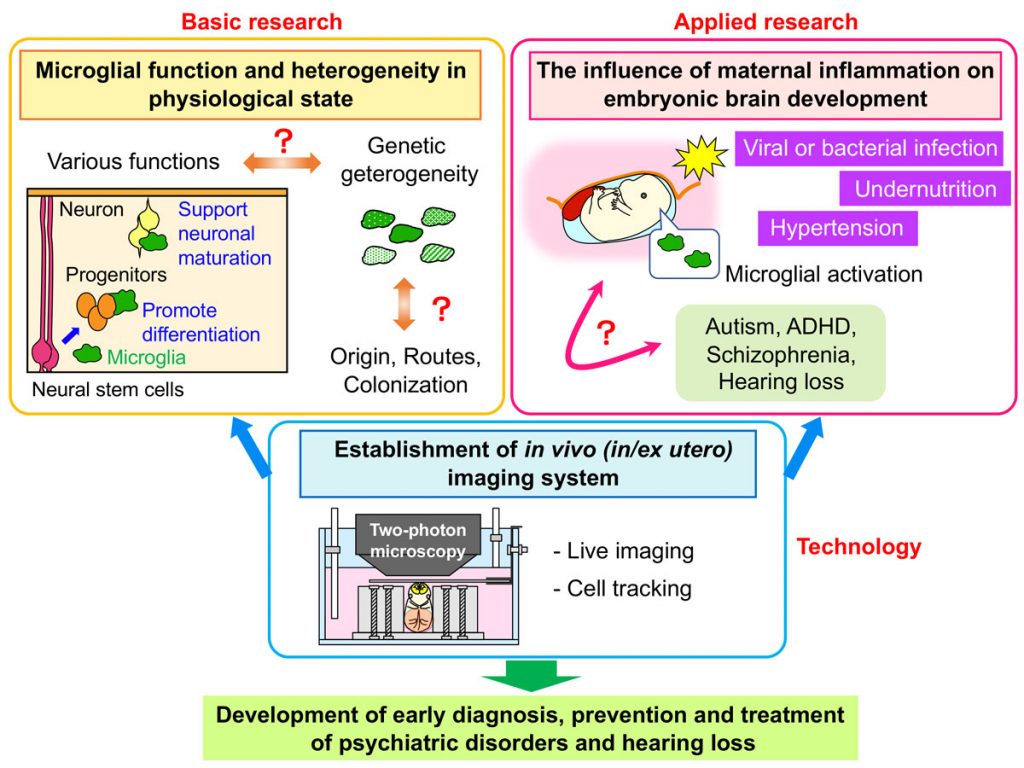Neuroscience
Developmental biology
Immunology

HATTORI Yuki
Starting year 2021
Nagoya University
Graduate School of Medicine
Associate Professor
Research Areas:Life Science
Research fields
Research Interests
Microglia
Cerebrum
Brain development
Glia, Maternal inflammation
Professional Memberships
The Japanese Association of Anatomists
The Japan Neuroscience Society
The Japanese Society for Neurochemistry
The Molecular Biology Society of Japan
The Japanese Society of Developmental Biologists
Society for Neuroscience
Main research topics
Neocortical development proceeds through precisely controlled various steps, which organize the positioning of neural-lineage cells based on their differentiation status in the developing brain. Neural stem cells, which are born at near the ventricular surface, make a fate choice of either repeating cell division to keep their immature state or differentiation, and the fated cells toward the differentiation mature into neurons, astrocytes, and oligodendrocytes with their migration toward the outside (basal side).
Previous studies aimed at investigating such mechanisms have been focused on only neural-lineage cells, but microglia, the resident immune cells in the central nervous system, have been recently reported to be involved in these steps. For example, microglia promote the differentiation of neural progenitor cells, regulate their numbers, and control the localization of neurons in the embryonic brain.
Interestingly, microglia change their distribution in the developing cerebral wall in a stage-dependent manner: they disappear from the cortical plate in the mid embryonic stage. We demonstrated that molecular mechanisms of microglial migration in the cerebral wall, and their transient absence from the cortical plate is required for postmigratory neurons to appropriately fine-tune the expression of molecules needed for proper differentiation (1).
On the other hand, microglia also contribute to vascular formation and branching. We recently reported that pericytes, the mural cells surrounding endothelial cells, facilitate microglial homeostasis and survival in the developing brains, thereby indirectly supporting microglial effects on neural progenitors, such as promoting the differentiation (2).
Recent single-cell transcriptome analyses revealed that microglia have a heterogeneity on their gene expression patterns not only in the adult brain but also in the embryonic stage. We are now investigating which factors induce microglial diversity, focusing on the environmental factors in the brain and microglial distribution routes or timing to reach the brain. We also try to understand the significance of the interaction between various cell types, such as microglia, surrounding neural lineage cells and vasculature forming cells through in vivo live imaging system.

Representative papers
Hattori Y, Naito Y, Tsugawa Y, Nonaka S, Wake H, Nagasawa T, Kawaguchi A, Miyata T. Transient microglial absence assists postmigratory neurons in proper differentiation. Nat. Commun. 11, 1631 (2020).
Hattori Y, Itoh H, Tsugawa Y, Nishida Y, Kurata K, Uemura A, Miyata T. Embyonic pericytes promote microglial homeostasis and their effects on neural progenitors in the developing cortex. J. Neurosci. 42 (3), 362–376 (2022).
Research URL
researchmap https://researchmap.jp/yukihattori
Laboratory Website https://www.takaki-miyata-lab.org
Topics of Neurochemistry (Articles on previous research) https://www.neurochemistry.jp/mu0czb0qu-15/#_15
Global issues to be solved through this project
The influence of maternal inflammation on microglial activity and function in the developing brain
This project is aimed at dissecting the roles of embryonic microglia in the brain both in the physiological and pathological state. We will first analyze the correlation between microglial colonization routes reaching the brain and the their genetical and functional heterogeneity. Through developing the in vivo imaging technology for embryos, we try to understand the significance of cell-cell interaction between various cell type, such as microglia, neural lineage cells, and vasculature cells. Furthermore, how maternal immune activation by viral and bacterial infection, malnutrition, or stress, changes microglial properties in the fetal brain is our big interest. Thus, we will investigate the influence of such maternal inflammation on the nervous system development and vascular formation in the embryonic brain as the next step. Our goal through this project is to establish the platform for developing research for early diagnosis, prevention, and treatment of mental disorders, hearing impairment and other brain developmental abnormalities.
Interview
No interview
News
-
お知らせ
T-GEx Fellow Dr. Yuki HATTORI, Nagoya University, has been awarded the 25th Japan Neuroscience Society Young Investigator Award for 2025
-
お知らせ
T-GEx Fellow Dr. HATTORI Yuki, Nagoya University, was awarded the 26th Morita Science Research Encouragement Award.
-
お知らせ
A paper by T-GEx Fellow Dr. HATTORI Yuki (Nagoya University) has been published in Viewpoint of the Journal of Experimental Medicine.
-
お知らせ
T-GEx Fellow Dr. Yuki Hattori (Nagoya University) received the Inoue Research Award from the Inoue Science Foundation.
-
お知らせ
T-GEx Fellow Dr.HATTORI Yuki, Nagoya University, and T-GEx Fellow HAYAKAWA Hisashi, Nagoya University, received “The Commendation for Science and Technology by the Minister of Education, Culture, Sports, Science and Technology The Young Scientists’ Award”.
-
お知らせ
Research result of T-GEx Fellow Dr.HATTORI Yuki, Nagoya University, was published in the American scientific journal “Cell Reports”.
-
お知らせ
The 2nd Kick-off meeting for AY2022 was held.
-
お知らせ
The name was changed to T-GEx Fellow and T-GEx Associate.
-
お知らせ
Academic Mentor for FY2021 T-GEx Fellows has been decided.
-
お知らせ
Kick-off meeting for AY2021 T-GEx Fellows was held.
-
お知らせ
The 8 T-GEx Fellows were selected for AY2021 T-GEx program.

